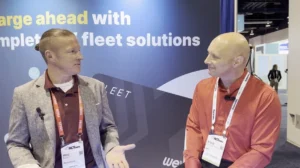Can the SHIP IT Act Help Truck Drivers, OTR Freight, and Global Supply Chains?
When the global supply chain broke down in the COVID pandemic, most of the focus was put on the international supply chain and the myriad of canal blockages and empty freight containers. What didn’t get nearly as much mainstream or even industry attention were the issues hundreds of millions of workers were facing, including the ones sailing those ships, hauling those containers, or driving trucks. The recently-proposed SHIP IT Act, a House bill introduced by Reps. Dusty Johnson, R-S.D., and Jim Costa, D-Calif., is looking to right those wrongs by addressing the staffing issues, pay, and working conditions of these vital workers by providing tax credits and money to fix infrastructure issues relating to parking.
Trucking and the global supply chain have become increasingly tight knit. In the US alone, trucks and truck drivers move about 3.3 billion tons of freight, representing almost three-quarters of all goods shipped in the country. Truck drivers in the US are vital in how goods get to store shelves, but issues in staffing, staff retention, and working conditions are not new, and have only been exacerbated by the pandemic.
The SHIP IT Act aims to address these challenges through grant opportunities, truck driver recruitment investments, an easing of the CDL process, new truck parking infrastructure, and more specialized permits to help keep trucks moving during emergencies. Nicole Katsikides, a research scientist at Texas A&M Transportation Institute, breaks down the full scope of the bill and why she sees it as a step in the right direction for addressing much-needed solutions to supply chain workers’ lingering problems.
Nicole’s Thoughts
“The SHIP IT Act, the intention of it, I think is good because for a long time the types of things that the SHIP IT Act intends to resolve have been a problem, but they’ve been exacerbated, especially by the pandemic and the supply chain challenges that we’ve seen over the past couple of years since the shutdown occurred in 2020.
The SHIP IT Act expands and is important for industry because it expands on opportunities to support truck drivers in many ways. And so if it gets implemented the way it seems to be intended, that can help truck drivers, especially to get truck drivers incentives or finances to help them get the training in order to become truck drivers, offers incentives to help them once they become truck drivers.
There’s a little bit of incentive there in terms of taxes to support them and their business and be able to help them offset some of the costs of being a truck driver, such as paying for parking. There’s funding to try to encourage the development of truck parking. That’s currently something that federal funds can be used for today, but those funds compete with other projects the way they’re currently set up. So this appears to be a dedicated fund to support truck parking expansion. It still is a fund that would be something that would flow through the federal government to state DOTs.
Local governments and private sector can be partners; sometimes that can be challenging because state DOTs and local governments are not always in the business of developing truck parking. So there needs to be some support from the private sector if this becomes law and these grants become real. There needs to be some support from the private sector with the public sector to help identify how to build these things or where it’s going to work and what is the best way of doing this, what are the best amenities that need to go there, if any, where are the locations of need, there’s all kinds of partnership and insight that the private sector can provide.
So overall, I think that the SHIP IT Act, if it goes as intended, there’s a quite a lot that can be useful for industry and to help support truck drivers and trucking operations.
The other thing that the SHIP IT Act focuses on is streamlining different processes and permitting processes that sometimes in emergencies, even if they’re there for a good reason, they’re a good safeguard, most of the time during emergencies, it causes different processes to take longer, like permits and such. So during an emergency, these can be streamlined and it can improve the time that it takes to do these types of things. And that can help to support supply chains, especially when there’s distress. So in that regard, this can be awfully beneficial to industry as well.
One of the biggest problems that I’ve been working on in terms of supply chains as it relates to trucking is this need for parking. There’s just not enough spaces for all of the drivers that are out there. There’s also a need to know where there’s availability. A lot of times there’s not information to say, this lot is full, but there’s this other lot that you could consider. And so it’s not only a capacity problem, it’s an information problem as well. The SHIP IT Act allows states to use this funding to implement information systems as well. And although that too is an eligible expense under existing federal funding, the dedicated pot of money for this is important. In terms of being able to separate truck parking projects from other types of projects and to eliminate that competition for what a state DOT, when they only have so much, they have to address certain things like bottlenecks and safety problems. And so truck parking competes with that, and that can be a challenge as well. So having a dedicated fund will certainly help with those things.”









